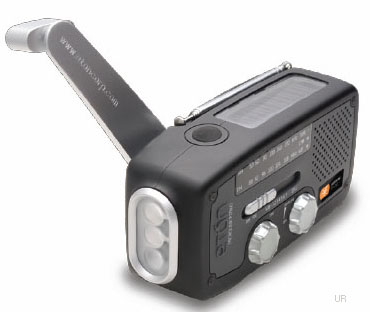
The shortwave Eton Microlink FR160 is one of the noted “specially-designed radios” capable of receiving international broadcasts (like those from the Voice of America) which might compete with state-owned stations.
International broadcasters (and those cutting their budgets) should ask themselves the following question:
If shortwave radio is no longer relevant in today’s high-tech world, why are these radios suddenly being banned in a country controlled by a repressive regime?
The government of Zimbabwe apparently fears the little self-powered shortwave radio you see on the right. —>
Read the Media Institute of Southern Africa’s reaction to the radio ban in the Huffington Post:
(Source: Huffington Post)
Media freedom campaigners said Friday police in Zimbabwe are breaking the law by seizing and banning small radio receivers that can tune in to stations not linked to the state broadcasting monopoly controlled by President Robert Mugabe’s party.
The Media Institute of Southern Africa said Friday no regulations outlaw the hand-cranked, solar powered radios that democracy and election support groups plan to use ahead of a referendum on a new constitution next month and crucial elections later in the year. Police insist the radios and cheap Chinese 3G smartphones with GPS capability are being supplied by “subversive organizations” and pose a security threat surrounding the polling.
[…]”The importance of a radio set cannot be overemphasized as it is a generally affordable legal gadget used for receiving information by the public,” the group said.
Police efforts to “criminalize the distribution and possession of the radio sets” infringed citizens constitutional rights to freedom of expression and basic civil liberties,” it said.
Such radios and other equipment were seized in recent police raids on the Zimbabwe Peace Project, a human rights group that monitors political violence, and the independent Zimbabwe Election Support Network.
Police allege those and other groups were planning to mobilize “recruits” with unauthorized communications devices in rural districts across the country, traditionally voting strongholds of Mugabe’s party.
The Elton [Eton, actually] Microlink radio, at a cost of about $30, has channels able to receive Voice of America broadcasts beamed in from neighboring Botswana and shortwave broadcasts on Zimbabwe from Europe.
The state Zimbabwe Broadcasting Corp. has four radio stations fiercely loyal to Mugabe. State and independent newspapers are not commonly found in impoverished rural districts where communities rely for information on radios only receiving state radio and powered by batteries that are often in short supply.
Police warned this week that the activities of some Western-backed non-governmental organizations and rights groups now verged on espionage. People found in remote areas with the cited devices could face arrest.
They said the “specially designed radios are not compatible with state-owned radio stations” and could inflame election tensions by promoting hate speech.[…]

I got one of those Etons around the time this was written to save on batteries. Thing is it isn’t shortwave and you can tell by looking at the frequency slider. AM/FM only with the USA version also having NOAA
I believe that shortwave has become a medium of last resort and has to be seen as part of a media solution, not the sole method of getting an idea across a border. I find that radio fans tend to ignore the impact that TV is making. There are about 8 countries in the world where shortwave still makes sense as a strategy for getting an idea across to a sizeable public. I think Zimbabwe is one of those countries.
Hi, Jonathan,
I tend to agree. There are only a few countries that have no other viable options than shortwave radio for international information. We find, at ETOW, that there are still a lot of countries where the rural, remote areas either lack access to information or the folks living there are simply too impoverished to afford satellite TV; Rwanda, Cameroon, Uganda, and Cameroon are good examples. For them, we find shortwave still a viable and valuable rural information option. In many of those countries, the urban areas have access to TV resources.
Cheers,
Thomas